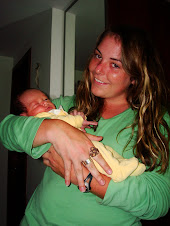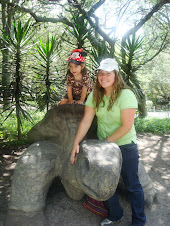

Unexpectedly one weekend, one of my gringa friends and I were swept off to Baños, the quaint Ecuadorian tourist town named for its thermal hot springs and famous for its many miracles. At the heart of the plaza resides the basilica or the Church of the Virgin of the Holy Water, Nuestra Señora del Agua Santa. The church is a place of pilgrimage for those who come to thank the Virgin for many miracles and to ask her blessing. The church was built in Gothic style from volcanic rock at the turn of the 20th century. Inside the basilica are depiction of the volcanic eruptions and the Virgin's miracles, each looming mural tells part of the story, as you journey through a little bit of history made flamboyant by folklore, you complete a journey around the entire sanctuary. As the legend goes: While Senor X was fleeing from the roaring Tunguragua, he fell off his horse crossing the Rio Pastaza bridge and as he was plummeting to the torrents below, yelled 'Holy Mother of the Holy Water' and he was miraculously saved.
In honor of the legend a thriving outdoor adventure attraction was born in the form of a death-defying leap off the San Francisco Bridge over the Rio Pastaza. Every tour agency in the tiny town advertises the infamous Bridging dive, which is perfectly coined in Spanglish, Puenting. Hannah was completely stoked to take part in such an absurdity. I was less than thrilled but peer pressure got the better of me and we were off to commit risk annalist suicide. The gorge beneath the San Francisco is quite scenic, but somehow the 100m (328 ft) drop just tends to mangle its majesty. A poor Quiteño boy fighting back tears was on the ropes when we arrived. All his friends were circling and chanting ¨Si se puede¨ (you can do it). Each time, at the shout of three he would reel himself back in and cling to the frail railing amidst waves of frustrated groans. When asked how was it? One of the burly Ecuas guys smirked, ¨It´s definitely a religious experience¨ prompting a boisterous chortle to pierce the shaky tension. My friend, still super pumped, got suited up and scaled the doomsday plank. On the air’s edge, she was hit by a chilling case of ¨What exactly was I thinking¨ as the entire town of Baños emerged to watch the spectacle. Moments lapsed and finally the very patient Bridging overseer let her go unexpectedly into a blissful backwards free fall. She swayed like a pendulum beneath the bridge. Even though she was only a suspended spec, I could see her wild grin as some chicos from town reeled her back to Earth. Then …umm…chuta…it was my turn. 
As I was being harnessed, Juan gave me a very grave pep talk. Si esperas por mucho tiempo y piensas tantisimo, sufres mas. Solamente hazlo. Salte no mas¨ (If you wait for too long and think about it, you´ll suffer more. Just do it. Jump). I quiveringly climbed over the rail, waited for my buddy to snap a pic and said a quick prayer as Juan counted to three. On three and a half I just dove. I remember thinking on the way down God I totally wouldn’t blame you if something happens because this is just ridiculously dense of me. All in all, it was a wild ride and I guess one of those ¨Fearless¨ moments in life.
When we had just stepped off the bridge and rounded the corner to town, a group of three little, old women, who were vending sugar cane juice, jellies, and taffies accosted us. They simultaneously crossed themselves with the catholic seal of the Truine God and proceeded to hug us tightly. Maria, the little lady with her arms wrapped around me, exclaimed, ¨Ay Dios mios, casi me muero de miedo para ti. Es un milagro que estes bien. (Oh my God, I almost died of fear. It’s a miracle that you’re ok). We chatted for a few minutes as they continued to love on us and tell us how crazy we were. When we finally escaped their loving grasp, we were confronted by friendly gestures from the rest of the townspeople who had been watching the display. Two men playing chess with llama, church, and indigenous figurines on the street corner, broke concentration long enough to laughingly tell us, ¨I was just sure you weren’t going to do it. ¨ So, the crazy leap of faith turned out to be more fun and symbolic than originally anticipated.
One of the many reasons why I love traveling with one of my more adventurous buddies is because we just stopped at a street vender (which could always present a delicious, yet perilous digestive risk) and bought a late lunch of corn and fritada chunks, topped with a tomato, onion, and cilantro salsa. We dabbed on some ahi, Ecuadorian hot sauce, and were on our way to explore the town festivities. I happen to love Baños because it is such a safe and charming little get away from the big city. In many ways, Baños reminds me of Staunton, VA. All the streets (one way of course) are all laden with stone and the sidewalks are paved with bricks. Lampposts get you from point to point and the nightlife is bustling with folk music, distinctively unique restaurants, and little shops. We met our friend from USFQ and her college friend who was visiting from the States for dinner. It was a relaxing night conversing about Ecuadorian customs and I must say I enjoyed being surrounded by some sweet southern draw. After dinner, we embarked on a nighttime journey to the natural hot springs full of earthen minerals and constantly percolated by Tunguragua´s inner core.
The next morning we met them again at a little café for breakfast. The woman who owns the café is Dutch and her husband is Ecuadorian. She had always dreamt of having her own little restaurant, but never imagined she would fall in love and make homemade wheat biscuits and brew Colombian coffee for world travelers in an active Volcano town in Ecuador. The brewed coffee was so amazing. If you don’t already know I consume copious amounts of coffee on a daily basis. Our B-stud tag line joke is that we are addicted to coffee and Jesus, just not in that order. Since arriving in Ecuador, I think I have been through coffee withdraw. The coffee phenomenon here is Nescafe, which basically equates to going to Sheetz and getting a French Vanilla Cappuccino out of a machine or they brew espresso and then just kind of flavor hot water. The Ecuadorian marvel of the coffee imposter is quite baffling to me since we are in coffee plantation country, but alas the fresh fruit juices and batidos are a refreshing compensation. After a rocking breakfast, we rented bikes for the day and pedaled off to the Cascade Trail. When we rented the bikes we were told that the route was all downhill, mentirosas. We, however, have become quite accustomed to the extravagantly hyperbolistic nature of Ecuadorian assurances and made it successfully through the huffing and puffing parts of the terrain. We stopped at the cascades and were just awestruck by Ecuador´s landscape and God’s glorious design. I will say it’s the fastest I’ve ever been on
a bike, some parts of the 18km ride were treacherous given the cliffs, tunnels, and traffic, but it was such a blast. Baños is technically the gateway to the Amazon, so it has a very tropical and lush selva vibe. We ended at the thundering Pailon del Diablo waterfall and it was just a powerful as the first time I experienced it. We decided to hitch hike a ride back to town on the back of a truck with other bikers.
Baños is famous of its sugar cane products and melcochas (taffies). So we tried the sugarcane juice as highly recommended by the Lonely Planet Guide Book and could barley muster two sips of the vile olive substance before deciding that once again LP lead us way astray. The process of making the melcochas is quite intriguing. In the entrance of just about every store, men were slinging the gooey substance, attached to a hook at the other end, like a jump rope in order to work in all the sugar.
We received fresh samples as souvenirs and then partook of the Ecuadorian almuerzo, which consist of a jugo, bowl of soup, and plate of rice, vegetables, and usually chicken for a $1.50. We dashed to the bus station and caught the last ride of the night back to Quito. On the 4.5 hour ridethe peach, apple, pear, and strawberry farmer from the north, and I picked out gorgeous plots of farmland and dreamed of a ¨Walk in the Clouds¨ romantic little lifestyle, living off the land in this gem of a country that we have so come to love. The only negative in the scenario of living on the outskirts of beautiful Baños would be the emergency volcano evacuations…yikes!
















